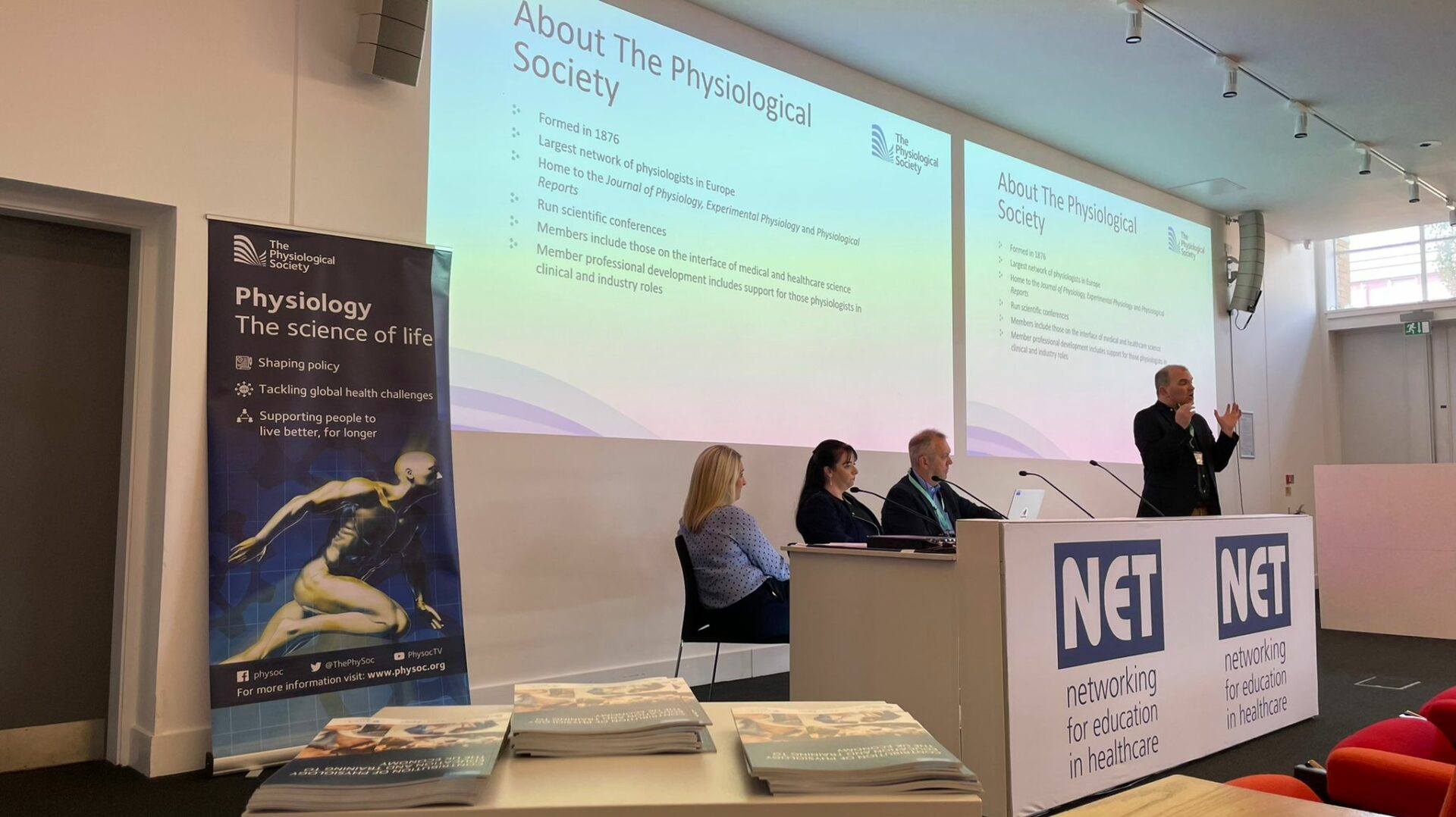Shania Pande, Policy Officer, The Physiological Society
The Physiological Society held a symposium at the Networking for Education in Healthcare (NET) conference at Lancaster University, UK The conference brings together a wide range of healthcare professionals to build networks and create a sense of belonging to the healthcare community amongst both staff and students.
It was held on 6-7 September offering a wide range of programmes such as keynotes, peer-led themed sessions, symposia, workshops and posters. The sessions included topics such as global health and sustainability, key challenges in health care education, student mental health and well-being and many more.
The role of physiology in healthcare science and nursing education
The Society’s symposium entitled ‘Educating the next generation of healthcare professionals: Contribution of Physiology teaching’ discussed the Society’s report Contribution of Physiology Education to the UK Economy and the role of physiology in healthcare science and nursing education. The symposium included a panel discussion with the Co-Chairs of the project Professor Derek Scott from The Physiological Society and Professor Brenden Cooper from the Academy for Healthcare Science, Leicestershire, UK. They were joined by Catherine Ross, the Chief Healthcare Science Officer for Scotland; and Dr Alison Wood from Queen Margaret University, Edinburgh, UK who supported the development and launch of the report back in June.

Making an impact
The session began with contributions from Professor Derek Scott and Professor Brendan Cooper who gave an overview of the report’s findings and how healthcare science had been critical in the response to the COVID-19 pandemic. As Derek pointed out;
“Physiology graduates contribute £22.6 billion to the UK economy annually which is equivalent to supporting 777,200 jobs. Over 56% of critical healthcare occupations are filled by a graduate who completed a course with a core physiological component. This report helps us realise how reliant healthcare education is on physiology education.”
Similarly, Brendan noted that,
“Healthcare scientists are often the unsung heroes; they form a part of the multidisciplinary team that was critical during the COVID-19 pandemic. Fundamental physiology understanding underpins the work of healthcare science. The report helps us understand the wider benefits of physiology from varied career opportunities to the benefits to society. We will only improve healthcare when we recognise the value of physiology and the contribution of healthcare scientists.”
Time and the lack of it
The symposium was an opportunity to speak directly with other clinical educators about the barriers they face in ensuring that students are taught elements of physiology that help them to provide higher quality care to patients. Common barriers identified included the lack of time within curricula to teach complex physiology alongside those skills that are mandated for nurses to qualify to practice.
This was echoed by Dr Alison Wood’s presentation on integrating physiology within the curriculum when she noted that;
“Nurses are the biggest part of the NHS and physiology is a key element of pre-registration nursing education. However, physiology is often not given enough time. There is a need for a collaborative approach between physiologists and nurses to teaching the future nurse, and other health professions.”
A problem of visibility
The session also heard from Catherine Ross from the Scottish Government about the breadth of disciplines covered by her remit as Chief Healthcare Scientist and the contribution of physiology within a significant proportion of those roles. She also noted that the future of healthcare science relied on a larger workforce that appreciates the contribution that physiology makes to their education and training.
As she noted during the session;
“The UK has over 53,000 healthcare scientists and about 80% of diagnostics are performed by healthcare scientists. Along with the other Chief Healthcare Science Officers, my role is in education workforce and planning. There is a need to educate and train more clinical physiologists as physiological scientists impact every part of the clinical pathway. They are a key group, but a relatively invisible group.”
Strengthening relations
The symposium allowed healthcare professionals from different backgrounds to come together and discuss the role of physiology in education and highlight some of the issues facing them in relation to nursing education, teaching, training and more. It helped strengthen relations between individuals working within the health and care sector.
The Society will continue to further the importance of physiology education at other conferences including the RCN Education Forum National Conference & Exhibition in April 2023.
You can download the full report ‘Contribution of physiology education and training to the UK economy’ here.
